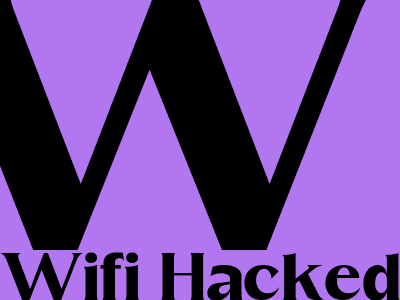WiFi Hacked: Protect Your Network and Devices
Introduction
In the digital age, WiFi networks have become an essential part of our lives. We rely on them to connect to the internet, stay connected with friends and family, and access entertainment. However, as convenient as WiFi networks are, they are also vulnerable to hacking. Hackers can gain access to your network and devices, stealing your personal information, accessing your financial accounts, and even controlling your smart home appliances.
How Hackers Gain Access
There are several ways that hackers can gain access to your WiFi network:
- Weak passwords: One of the most common ways for hackers to gain access to WiFi networks is through weak passwords. Many people use simple passwords that are easy to guess, such as "123456" or "password." Hackers can use brute force attacks to try every possible combination of characters until they find the correct password.
- Unsecured networks: Another common way for hackers to gain access to WiFi networks is through unsecured networks. Unsecured networks do not require a password to connect, making them easy for hackers to access. Hackers can use a variety of tools to scan for unsecured networks and connect to them without authorization.
- Malware: Hackers can also gain access to WiFi networks through malware. Malware is malicious software that can be installed on your computer or mobile device without your knowledge. Once installed, malware can give hackers remote access to your network and devices.
Consequences of WiFi Hacking
If your WiFi network is hacked, there are several consequences that you may face:
- Identity theft: Hackers can use your personal information to steal your identity. They can open new credit card accounts in your name, take out loans, or file fraudulent tax returns.
- Financial loss: Hackers can access your financial accounts and steal your money. They can also use your credit card information to make unauthorized purchases.
- Data breach: Hackers can access your sensitive data, such as your medical records, financial information, and personal photos. They can sell this data to other criminals or use it to blackmail you.
- Control of smart home appliances: If your smart home appliances are connected to your WiFi network, hackers can gain control of them. They can turn on your lights, unlock your doors, or even access your security cameras.
How to Protect Your WiFi Network and Devices
There are several steps you can take to protect your WiFi network and devices from hackers:
- Use strong passwords: When creating a password for your WiFi network, use a strong password that is at least 12 characters long. Avoid using common words or phrases, and include a combination of uppercase and lowercase letters, numbers, and symbols.
- Secure your network: Make sure your WiFi network is secure by enabling encryption. Encryption scrambles your data so that it cannot be intercepted by hackers. Most routers support WPA2 or WPA3 encryption, which are the most secure encryption methods available.
- Keep your software up to date: Software updates often include security patches that fix vulnerabilities that hackers can exploit. Make sure to keep your operating system, router firmware, and other software up to date.
- Use a firewall: A firewall is a software or hardware device that blocks unauthorized access to your network. Firewalls can help to prevent hackers from gaining access to your network, even if they have your password.
- Be careful about what you click on: Hackers often use phishing emails and websites to trick people into giving up their passwords or downloading malware. Be careful about what you click on, and never enter your personal information on a website that you do not trust.
Conclusion
WiFi networks are essential for our modern lives, but they are also vulnerable to hacking. By following the tips in this article, you can protect your WiFi network and devices from hackers and keep your personal information safe.

Comments